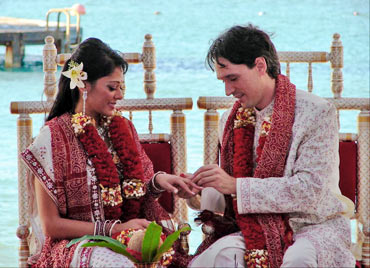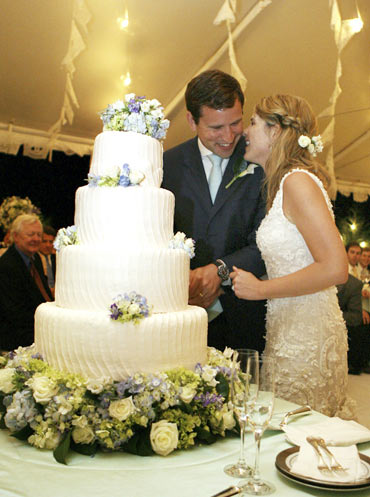
An attitude of 'to each his own' might dominate the Indian political scenario at the moment, but as far as Indian weddings are concerned, unity is the buzzword. True to the core philosophy of Indian democracy -- 'Unity in Diversity' -- modern-day Indian brides and grooms are looking forward to weddings that are an amalgamation of wedding practices from across the country.
Take the case of Purvi Shah, 32, who is a medical graduate practicing in San Diego, California. When Purvi, a Gujarati by birth, got married to her fiance Sharad Narayanan this November, she had an elaborate ceremony. This included rituals and customs specific not only to the bride or groom's culture but also had ceremonies typical of other communities as well. For instance, Purvi had organised for a mehendi and sangeet ceremony apart from the traditional garba ceremony, typical to Gujarati weddings. Like the Bengali bride, she also wore a traditional Bengali red bordered saree with sankha and pala (typical bangles worn by Bengali married women) on the day of her marriage. Her reception menu consisted of both Continental cuisine and delicacies from across India.
When asked about the presence of diversity in her marriage, Purvi justified her choices by saying, "I married late; marriage was a big occasion for me. I wanted the best of everything and was keen to amalgamate anything and everything which I had taken a fancy to over the years. Therefore right from Bengali bangles to Gujarati garba, I ensured I had everything added to my wedding."

If you thought Purvi was an exception, think again. There are others of her ilk who are keen to have diversity as a theme in their wedding celebrations. Fusion weddings are much in vogue. Be it in menu selection or the trousseau hunt, the bride and groom today want to go for a marriage which is stylised and cosmopolitan.
Says designer Jaya Misra, who specialises in bridal attire: "In the past, the brides had to plan for just two days -- the wedding and the reception. Today, the wedding ceremony is a weeklong affair and the bride needs to buy dresses for the sangeet, mehendi, cocktail and bachelorette parties as well. In most cases, the bride wants to plan it to the minutest detail. She is keen to look like a diva on this special day and expenses are no bar."
She admits though, that in most cases it is the young, independent, working urban woman who indulges in such elaborate affairs. Marriage is a conscious decision for her and she is not hesitant to spend. So she looks for the best and is not necessarily a stickler to tradition. In fact, she wants the best of all traditions amalgamated into one single garment which reflects her personality and is complementary to the theme of the wedding.

This, however, does not mean that the bride is discarding traditional dresses. "Though modern cocktail dresses are a must for the contemporary bride, she can't do without her traditional attire either. The difference is, she is opting for dresses that set her apart. I would even say that today's brides have a progressive take on tradition," says Richa Kanoi, proprietor of a well known designer store in Kolkata.
A similar trend is seen in jewellery as well. "Today jewellery is no longer just a stridhan to be tucked away in lockers; the urban working woman wants to wear statement pieces that are decorative enough to be flaunted," says Pankaj Parekh, chairperson (East) of the Gem and Jewellery Export Promotion Council. So kundan jewellery, typical to North India, is being worn by South Indian brides as well, if it suits their dress on that particular day. Weddings have indeed become cosmopolitan, even with jewellery.
As far as food is concerned this same trend seems to be prevalent. Says Piyush Makharia, proprietor of a premier restaurant in Pune which organises lavish wedding parties: "We are seeing a confluence of cultures for wedding catering with hosts asking for 'Indian' food with slivers of taste of many cuisines as compared to the earlier trend of just Punjabi, Rajasthani, Marathi or Mangalorean..."

Agrees Arvind Bhatnagar, executive director for PDK Shenaz Hotels Pvt Ltd that runs the Ivory restaurant in Kolkata and also caters to high profile weddings: "People want to savour the best of all cuisines, since weddings today cater to an increasingly diversified guest list with equally diversified tastes. So the common norm in almost all weddings today is to have various counters, often accommodating diverse global cuisines as well."
This is indeed a challenge for the chef, says Debojyoti Sarkar, executive chef, Ivory. "When you have Mexican and Chinese counters cohabiting side by side, you need to strike a balance somewhere. For a chef or the menu planner, this is indeed a daunting task."
The main issue is to understand the clients' pulse and arrange for a menu that will suit their as well as their guests' taste. "The clients today want to experiment and try out new things; at the same time, they are apprehensive that they might not be good. To appease such clientele we have to come up with new items that are unique yet appealing in taste." Sarkar gives an example of the fusion dessert gulabjamun in rabri, which has Swiss chocolate filling inside the traditional sweet and melts in the mouth. However he admits: "At the end, whatever diversity you have, unless it tastes good the food goes waste."

The global Indian cosmopolitan bride and groom are also infusing trends from the West. "A wedding is no longer a single day affair and so when they hire our resort, they want many additional parties like pool parties, cocktail parties etc," says Shamim Ahmed, general manager, Ibiza, a resort in Kolkata which organises many high-profile weddings.
And among all the new additions to the two-day wedding schedule, the bachelor/ bachelorette and cocktail parties seem to be the most popular. "During the wedding season, our club is booked for bachelor parties almost everyday -- they are being hosted not only by men, but an equal number of women as well," says Arvind Bhatnagar, who heads Sisha Reincarnated, a popular nightclub in Kolkata.
For most upper middle class brides and grooms, a wedding is now a conscious decision and not one which is totally controlled by their families. Naturally, even in arrangements pertaining to weddings, they have a complete say. Moreover, with cosmopolitan marriages becoming more common than ever, a fusion of culture is inevitable at this most important event in a girl or boy's life.

Nilanjana Chakrabrorty, a well-known name on the social circuit of Kolkata, recently attended the wedding of dancer Tanushree Shankar's daughter Sreenanda Shankar with her Parsi groom Gev Satarawalla.
She observes, "Cross-cultural weddings are a common affair today and so marriages have no option but to become cosmopolitan. In many cases, the bride and groom are keen to understand their marriage vows as well. At Sreenanda Shankar's wedding there was this excellent priest Nachiketa Bhattacharya who was wonderfully singing the marriage hymns and at the same time explaining them as well. So the couple was fully aware of the sacred vows that they were taking."
Cosmopolitism is definitely in. The traditional big fat Indian wedding has transcended regional borders -- be it in choice of life partner, jewellery, trousseau, food or ambience -- it's taking on a pan-Indian look.
Basic trousseau for the cosmopolitan bride:
(As suggested by Richa Kanoi)
Wedding enhancers: